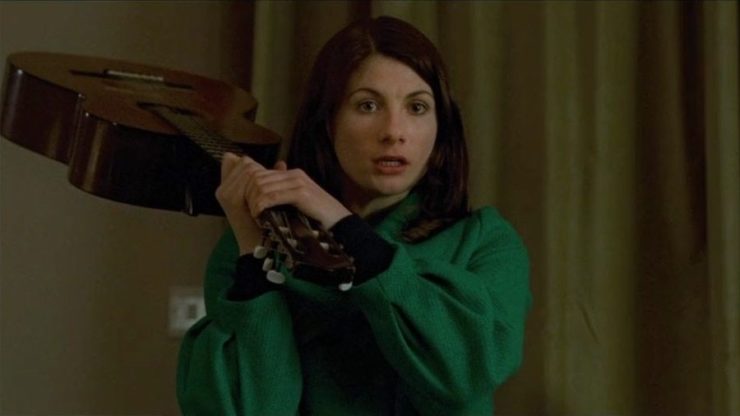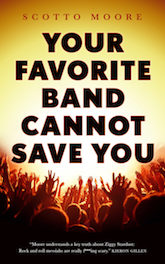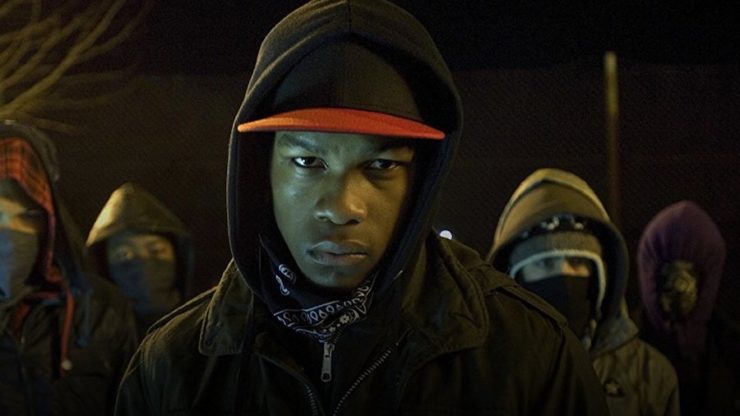When I recently took my seven-year-old daughter to see The Kid Who Would Be King, I did so out of parental obligation, not out of personal interest. Much to my surprise, I was rewarded with an exceptionally well-crafted adventure film—one with a winning and diverse cast, exciting setpieces, and entertaining supporting performances by Patrick Stewart and Rebecca Ferguson. None of this would of been a surprise to me, however, had the trailers touted the fact that the movie was directed by Joe Cornish.
Then again, I shouldn’t be too surprised. With only one directing credit to his name, and a few co-writing credits alongside Edgar Wright on The Adventures of Tin-Tin and Ant-Man, Cornish is hardly a household name, especially since his directorial debut came out in 2011. But, oh, what a debut it was…
Like The Kid Who Would Be King, Attack the Block could be mistaken for standard genre fare at first glance. The story of a group of London teens fending off an alien invasion, the movie raises questions about what makes a community and what (or who) we call a monster.
If we pay closer attention to Attack the Block’s cast and themes, though, it’s hard to ignore the fact that it’s one of the most important sci-fi films of the 2010s, cannily anticipating the direction the genre would take up through the present moment.
One of the major differences between Attack the Block and your average alien invasion movie is obvious at first glance, as the cast is primarily black, with the most prominent white character played by a woman. Although there’s a long history of diversity in science fiction film and literature, complaints from some fans about non-white versions of legacy superheroes, or the increased emphasis on casting people of color in Star Wars, of the fact that a woman now controls the TARDIS in Doctor Who remind us that white- and male-centric stories remain the default.
It’s worth noting, then, that some of the actors who’ve featured in some of these recent controversies appear in Attack the Block. Not only do Franz Drameh (who plays Jefferson Jackson, aka Firestorm, on Legends of Tomorrow) and Jodie Whittaker (who stars as the Thirteenth Doctor in the latest season of Doctor Who) have early roles in the movie, but Star Wars’ John Boyega makes his film debut here.
As Moses, the leader of a group of teen boys living in an apartment block in South London, Boyega offers an impressively nuanced performance. We’re introduced to Moses and his friends first as faceless threats to nurse Sam (Whittaker), as we follow her walk home through a graffitied city block at night. When Moses confronts Sam to demand her valuables, he tries to project menace, wielding a switchblade and threatening to “murk” her. But Cornish’s camera catches the nervous glances he throws at his mates and the way he fumbles the ring she surrenders to him. Boyega plays Moses as a man thoroughly unsuited for the part of remorseless street tough, his brow creasing into a glare to hide his scared, skittish eyes.
Boyega inverts this act later in the film, when dealing with Hi-Hatz (Jumayn Hunt), a gun-wielding drug dealer who has it out for Moses. Facing down Hi-Hatz while being pursued by the alien monsters, Moses has to show deference to the older man, lest his actions be interpreted as disrespect, while also preparing to fight the oncoming horde. Boyega seamlessly switches between determination and compliance, fully embodying the impossible situation in which Moses finds himself, inviting empathy without sacrificing his strength.

Likewise, Whittaker gets to play Sam as far more than just the victim she seems in the opening scene. Initially, she responds to the mugging the same way most of us would: by calling the police, who arrive to detain Moses. In her mind, she has been wronged and Moses deserves to be punished for taking her property and making threats, to be put in handcuffs and perhaps to spend a short time in jail.
But whatever Sam’s desires or intentions, the outcome almost becomes far worse than she could have imagined as an alien attacks during the arrest, ripping the arresting officer to shreds before taking notice of the handcuffed Moses.
The look of astonishment on Whittaker’s face makes Sam’s realization clear: whatever justice she wanted or deserved for the loss of her property, it was not equal to the fate that was very nearly doled out once Moses was in handcuffs. Even though she sneers “My fucking hero” when Drameh’s Dennis suggests she thank Moses for driving her away from the monster and saving her life, Sam’s defensiveness suggests that she recognizes that the situation was never as cut-and-dried as she’d initially thought. Not only have Moses’ courageous actions complicated her first impressions of him as a faceless, mercenary thug, but the movie draws a clear connection between his arrest for petty crime and the near-death experience that follows.
In a world in which any person of color’s interaction with the authorities, no matter how minor or seemingly routine, has the potential to end in violence or death—or else in exposure to a dehumanizing system of law enforcement that feeds off of racial and economic inequalities (a less immediate but still destructive outcome)—we’re forced to question the standard ‘crime and punishment’ narrative the minute the alien’s attack disrupts the arrest and forces us (and Sam) to realize that there is more to the story. And more to Moses.
These interactions capture Attack the Block’s approach to moral quandaries. Science fiction has always used outrageous and supernatural situations to examine ethical assumptions, but rarely have films in the genre so directly addressed systemic racism and inequality. Before the invasion, Sam—a recent nursing school grad living in the block as she begins her career—saw little in common between herself and Moses, his friends, or even genial weed dealers Ron (Nick Frost) and Brewis (Luke Treadway).
Buy the Book


Your Favorite Band Cannot Save You
But during the attack, she realizes that she cannot disentangle her life from theirs. In the same way they have a responsibility to respect her — a responsibility Moses and his friends embrace by apologizing for mugging her and returning her property — she also has a responsibility to care for them, using her medical knowledge to heal their wounds.
To be sure, alien invasion stories have been told about onetime enemies becoming friends when faced with a hostile outside force, but Cornish isn’t interested in simply regurgitating a tired “us vs. them” plot. He avoids this in part by making the aliens thoroughly unrelatable, a sort of shadowy, snarling bear/dog mix distinguished only by their rows of glowing green teeth. The focus is less on the aliens themselves, or on telling a story about enemies who set aside their differences in order to team up against a different enemy; rather, Attack the Block is a movie about people discovering how they need one another, and how interconnected they really are.
After Moses risks his life to destroy the rest of the aliens, he’s rewarded with arrest by the police who arrive on the screen to point guns not at the monsters, but at the boys who stopped them. When the police pressure Sam to continue pressing charges against Moses and the boys, telling her “Don’t let them intimidate you, miss,” she responds, “I know them, they’re my neighbors. They protected me.”
By recognizing their common humanity, she breaks the patterns of inequality that teach white people to fear their black neighbors, just as Moses transcends the economic systems that leave him with so few options that mugging seems necessary. At the start of the film, no one saw Moses as anything other than a criminal and a burnout (Moses included). But as he hears the crowd chanting his name, when Sam acknowledges his actions as neighbor and protector, Moses finally sees himself as a hero, even if he does so while handcuffed in a police wagon.
That’s a pretty heavy concept for a movie about teenagers fighting fuzzy monsters with baseball bats and firecrackers, and it’s hardly the first film to address important issues through a science fictional premise. But before Get Out combined horror, satire, and racial alienation into a 21st-century classic, before Star Wars: The Last Jedi engaged in class warfare, and even before Black Mirror began warning of the horrors of smartphones and social media, Joe Cornish set the decade’s sci-fi off in a bold and thoughtful new direction, starting right there on the block.
Joe George‘s writing has appeared at Think Christian, FilmInquiry, and is collected at joewriteswords.com. He hosts the web series Renewed Mind Movie Talk and tweets nonsense from @jageorgeii.










